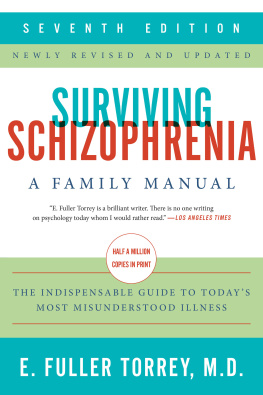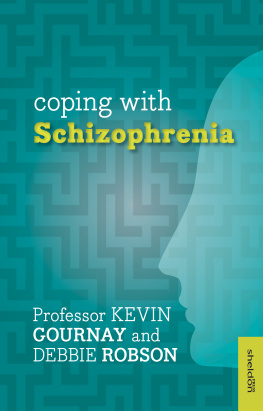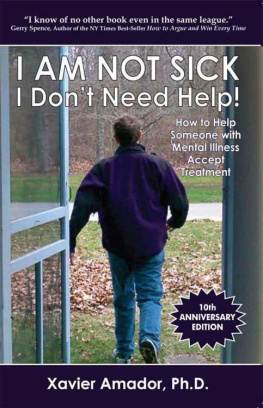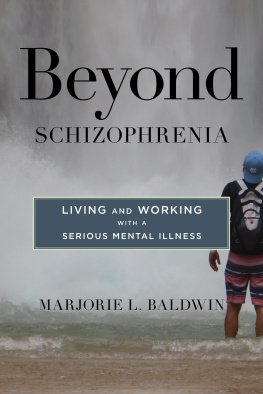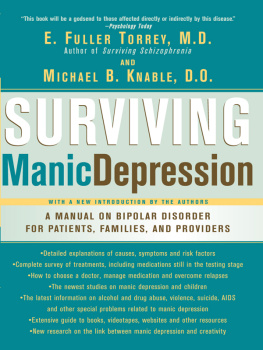I feel fortunate to have lived long enough to write a seventh edition of this book. It is very satisfying to see it continue to be widely used in the United States and in other English-speaking countries, as well as in translations in Spanish, Italian, Russian, Chinese, and Japanese. Such satisfaction, however, is tempered by disappointment that we do not yet understand the precise causes of schizophrenia nor do we yet have definitive treatments. When I wrote the first edition of this book thirty-five years ago I had thought that by now we would be much further along research-wise than we are. For this failure I blame my psychiatric colleagues for not demanding more attention to this disease and the federal government, especially the National Institute of Mental Health, for failing to do sufficient research. Despite my disappointment, I am hopeful that, at this time, we are on the verge of major research breakthroughs.
There are several new features in this revised edition. In ).
Thus it is my hope that this book will continue to be useful to those who have schizophrenia, their families, and those who are involved in the treatment care system. As I wrote in the Preface of the first edition, I hope that this book will help bring schizophrenia out of the Slough of Despair and into the mainstream of American medicine.
The purpose of this book is to make you aware of the progress of schizophrenia and the possible ways in which it may develop. The assessment of symptoms requires an expert. For proper diagnosis and therapy of all symptoms, real or apparent, connected with schizophrenia, please consult your doctor. In my discussion of cases, I have changed all names and identifying details while preserving the integrity of the research findings.
What then does schizophrenia mean to me? It means fatigue and confusion, it means trying to separate every experience into the real and the unreal and not sometimes being aware of where the edges overlap. It means trying to think straight when there is a maze of experiences getting in the way, and when thoughts are continually being sucked out of your head so that you become embarrassed to speak at meetings. It means feeling sometimes that you are inside your head and visualising yourself walking over your brain, or watching another girl wearing your clothes and carrying out actions as you think them. It means knowing that you are continually watched, that you can never succeed in life because the laws are all against you and knowing that your ultimate destruction is never far away.
Patient with schizophrenia, quoted in Henry R. Rollin, Coping with Schizophrenia
When tragedy strikes, one of the things that make life bearable for people is the sympathy of friends and relatives. This can be seen, for example, in a natural disaster like a flood and with a chronic disease like cancer. Those closest to the person afflicted offer help, extend their sympathy, and generally provide important solace and support in the persons time of need. Sympathy, said Emerson, is a supporting atmosphere, and in it we unfold easily and well. A prerequisite for sympathy is an ability to put oneself in the place of the person afflicted. One must be able to imagine oneself in a flood or getting cancer. Without this ability to put oneself in the place of the person afflicted, there can be abstract pity but not true sympathy.
Sympathy for those afflicted with schizophrenia is sparse because it is difficult to put oneself in the place of the sufferer. The whole disease process is mysterious, foreign, and frightening to most people. As noted by Roy Porter in A Social History of Madness, strangeness has typically been the key feature in the fractured dialogues that go on, or the silences that intrude, between the mad and the sane. Madness is a foreign country.
Schizophrenia, then, is not like a flood, where one can imagine all ones possessions being washed away. Nor like a cancer, where one can imagine a slowly growing tumor, relentlessly spreading from organ to organ and squeezing life from your body. No, schizophrenia is madness. Those who are afflicted act bizarrely, say strange things, withdraw from us, and may even try to hurt us. They are no longer the same personthey are mad! We dont understand why they say what they say and do what they do. We dont understand the disease process. Rather than a steadily growing tumor, which we can understand, it is as if the person has lost control of his/her brain. How can we sympathize with a person who is possessed by unknown and unseen forces? How can we sympathize with a madman or a madwoman?
The paucity of sympathy for those with schizophrenia makes it that much more of a disaster. Being afflicted with the disease is bad enough by itself. Those of us who have not had this disease should ask ourselves, for example, how we would feel if our brain began playing tricks on us, if unseen voices shouted at us, if we lost the capacity to feel emotions, and if we lost the ability to reason logically. As one individual with schizophrenia noted: My greatest fear is this brain of mine.... The worst thing imaginable is to be terrified of ones own mind, the very matter that controls all that we are and all that we do and feel. This would certainly be burden enough for any human being to have to bear. But what if, in addition to this, those closest to us began to avoid us or ignore us, to pretend that they didnt hear our comments, to pretend that they didnt notice what we did? How would we feel if those we most cared about were embarrassed by our behavior each day?
Because there is little understanding of schizophrenia, so there is little sympathy. For this reason it is the obligation of everyone with a relative or close friend with schizophrenia to learn as much as possible about what the disease is and what the afflicted person is experiencing. This is not merely an intellectual exercise or a way to satisfy ones curiosity but rather the means to make it possible to sympathize with the person. For friends and relatives who want to be helpful, probably the most important thing to do is to learn about the inner workings of the brain of a person with schizophrenia. One mother wrote me after listening to her afflicted sons descriptions of his hallucinations: I saw into the visual hallucinations that plagued him and frankly, at times, it raised the hair on my neck. It also helped me to get outside of my tragedy and to realize how horrible it is for the person who is afflicted. I thank God for that painful wisdom. I am able to cope easier with all of this.
With sympathy, schizophrenia is a personal tragedy. Without sympathy, it becomes a family calamity, for there is nothing to knit people together, no balm for the wounds. Understanding schizophrenia also helps demystify the disease and brings it from the realm of the occult to the daylight of reason. As we come to understand it, the face of madness slowly changes before us from one of terror to one of sadness. For the sufferer, this is a significant change.
The best way to learn what a person with schizophrenia experiences is to listen to someone with the disease. For this reason I have relied heavily upon patients own accounts in describing the signs and symptoms. There are some excellent descriptions scattered throughout English literature; the best of these are listed at the end of this chapter. By contrast one of the most widely read books, Hannah Greens

